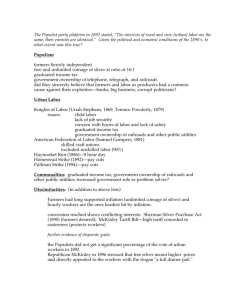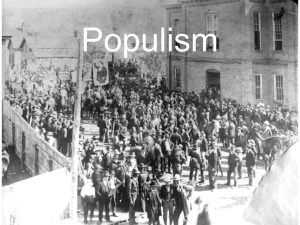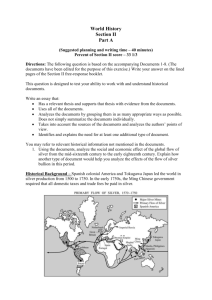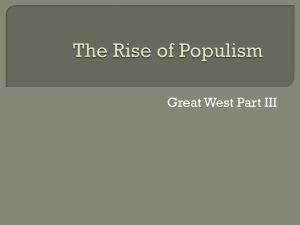Keepin' the Farmers Down
advertisement
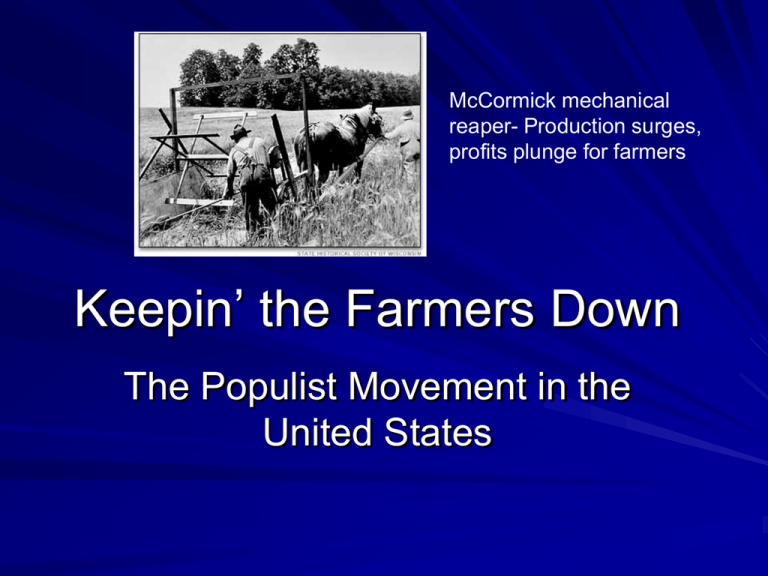
McCormick mechanical reaper- Production surges, profits plunge for farmers Keepin’ the Farmers Down The Populist Movement in the United States The Problems Agriculture became mechanized – Means: More capital needed Money for upkeep and repair Opening of new agricultural lands – Kept increasing farmland – Wanted to grow more crops to make more money Specialized Farm Products – Investing all time and capital into single ‘cash’ crop More problems…. Changing character of agricultural markets – International markets had grown 75% of international trade was crops – Middlemen and railroads often ate into profits Farmers did not see benefits of expansion The Grange—The First “The National Grange of the Patrons of Husbandry” – Worked to pass pro-farmer legislation – Instituted farming “cooperatives” Pooling capital Purchased machinery, supplies, and insurance Populist Party’s Omaha Platform (1892) Permanent union of working classes Wealth for all workers Government ownership of RR Government ownership of communication systems Flexible and fair distribution of currency Free & unlimited coinage of silver All land owned must be used Secret ballot (Australian ballot) Graduated income tax Direct election (by popular vote) of senators Main Populist Critiques: Too much emphasis on property rights Monopolies an economic/social evil Social Darwinism/laissez-faire are bankrupt ideologies Wealth was unevenly distributed Silver and Gold! Coinage Act of 1873- embraced gold standard Bland Allison Act 1878- required US gov’t to buy silver and put it into circulation as silver dollars. Also creates a 16:1 ratio (16 ounces of silver for one ounce of gold) Sherman Silver Purchase Act 1890- increased amount of silver gov’t purchases, meets demands of ‘silverites’ farmers and debtors who needed cheap money to pay loans A gold certificate, could be converted into gold coins. Used from 1882-1932 Silver dollar Silver and Gold (Farmer/ Borrower vs. Banker/Moneylenders) 1870’s farmers join Greenback Party, gain relief from low prices & high debt Relief…How? Inflation of the currency makes it easier for farmers to pay debts to the bankers (easy money for loans) Populists & later the Democrats (led by William Jennings Bryan in 1896) advocate the free silver approach Republicans led by William McKinley/Mark Hanna & eastern bankers/industrialists advocate the gold standard which will keep inflation down, and value of the dollar up. THE ISSUE- Free Silver. Should the U.S. adopt the free & unlimited coinage of silver and thereby inflate the currency to aid the farmers? Bryan and the Dems. say “Yes” Bryan delivers ‘Cross of Gold’ speech, says gold standard would be a burden, comparing the gold standard (and specifically its effects on western farmers) to the Crown of Thorns worn by Jesus at his crucifixion. Gold standard would allow Eastern bankers to force western farmers into widespread debt, leading to a consolidation of western property into the hands of the centralized banks. More thoughts on Gold vs. Silver Standard… McKinley & Repubs. say “No” The ‘Gold Bugs’ argue that currency should be tied to the gold standard Silver standard they argue will= runaway inflation The End Result? Populist Party becomes the “Demo-Pop” party as Dems. co-opted many of the Pop. Party platform, esp. the free silver issue After being defeated in 1896, Bryan ran and lost again in 1900 and 1908 , each time carrying mostly Southern and Great Plains states. McKinley wins pres. election in 1896 A victory for big bus., middle-class, & financial conservatives. Repub. Party control White House for next 16 years
